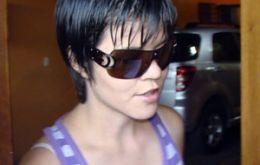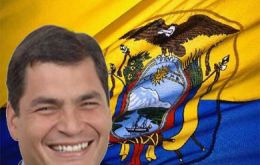MercoPress. South Atlantic News Agency
Stories for April 15th 2009
-
Wednesday, April 15th 2009 - 10:45 UTC
Lower House approves Brazil’s Sovereign Wealth Fund

Brazil’s Congress Lower House approved on Tuesday night approved legislation making an existing Sovereign Wealth Fund into a permanent fixture. The Chamber of Deputies voted 274-102 to approve a government bill making the fund permanent and approving an initial total for it of 14.2 billion Brazilian Reales, approximately 6.5 billion US dollars.
-
Wednesday, April 15th 2009 - 10:43 UTC
Kirchner denies recession and insists Argentina continues to expand

Two reliable private consultants and advisors confirmed that the Argentine economy has gone through two consecutive negative quarters, thus in recession. However former president Nestor Kirchner denies any recession and insists that the Argentine economy keeps expanding.
-
Wednesday, April 15th 2009 - 09:05 UTC
Bolivia expects 17% oil tax and royalties revenue drop in 2009

Bolivia is forecasting a 17% fall in its hydrocarbons tax and royalties revenues because of the fall in the international price of gas and oil sold to Argentina and Brazil according to official reports.
-
Wednesday, April 15th 2009 - 09:02 UTC
Colombia to explore for oil offshore Brazil

Colombian state-owned oil company Ecopetrol S.A. said Tuesday it signed an agreement with US-based Anadarko Petroleum Coporation to explore for crude oil off the coast of Brazil. Ecopetrol's subsidiary in Brazil will hold a 50% stake in block BMC-29, the company said in a statement.
-
Wednesday, April 15th 2009 - 08:54 UTC
Paraguayan president gives his name to love-child

The mother of the two year old child fathered by Paraguayan president Fernando Lugo confirmed she had desisted of the demand following the former Catholic bishop paternity admission and promise to give him his name.
-
Wednesday, April 15th 2009 - 08:53 UTC
Peruvian government firm on its anti insurgency policy

The Peruvian government defended its offensive against the remnants of the once-powerful insurgency “Shinning Path” as armed forces searched for a soldier reported missing following rebel ambushes that killed more than a dozen people last week.
-
Wednesday, April 15th 2009 - 08:48 UTC
Obama leaves for Mexico and prepares for regional summit test

United States President Barack Obama heads to Mexico Thursday and then continues on to Trinidad and Tobago for the fifth Summit of the Americas. Security concerns along the US-Mexico border are expected to top Mr. Obama's discussions with Mexican President Felipe Calderon, while the summit provides an opportunity to reinvigorate the US hemispheric ties and forge a regional response to the global economic downturn, according to a Voice of America report.
-
Wednesday, April 15th 2009 - 08:40 UTC
Bolivia opens three indigenous universities

The Bolivian government has opened three indigenous universities for Aymaras, Quechuas and Guaranis, and they will be linked to social movements, Education Minister Roberto Aguilar said
-
Wednesday, April 15th 2009 - 08:38 UTC
Ecuador grew 6.5% in 2008; forecasts 2.5% in 2009

Ecuador President Rafael Correa said that his country’s economic growth in 2008, which according to the latest estimates was 6.5%, was among Latin America’s highest despite the international financial crisis -- and despite defaulting on a portion of the nation's international debt.
